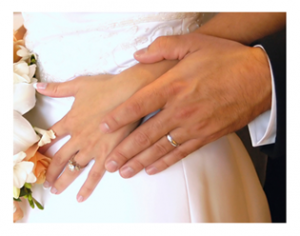It was an off-hand remark, but it startled me. Especially coming from a woman who had known me for years, and saw the misery of my divorce, albeit from a distance.
 She, on the other hand, has been married for 30 years, with her union intact despite the usual ups and downs that families encounter.
She, on the other hand, has been married for 30 years, with her union intact despite the usual ups and downs that families encounter.
They were young when they married. They’ve weathered their share of storms.
Still, when she said to me, “Maybe you aren’t cut out for marriage,” it surprised me. And it stung.
Naturally, the context of the conversation situates her comment, and I’ll get to that in a moment. But beyond taking offense (which I did), my first thought was “Oh, she thinks I’m not the marrying kind.”
Not the Marrying Kind?
The expression “not the marrying kind” was once assigned to men alone. Now somewhat outmoded, it nonetheless designates a man who is unwilling to commit to one woman. In other words, he’s a player, whose preference to remain “free” doesn’t reflect that he is a lesser man – only one who wants no permanent attachments.
As a label, “not the marrying kind” acts as a kind of warning system to a woman who is interested in tying the knot.
When my friend said I wasn’t cut out for marriage? Frankly, it shocked me. I was married for more than a decade, aware there were problems, but generally speaking, I liked being married.
I felt belonging. I felt safe. I was wrong on both counts, but at the time, my commitment was absolute. To say that I’m “not cut out for marriage” is, among other things, inaccurate.
At least, it was.
Togetherness to the Max
When we take vows of marriage, we effectively promise to stay together forever. But we don’t mean we’ll spend 24 hours a day together, or 18 hours a day together – every day – do we?
I recall hearing that we “marry for love, not for lunch.” It’s a point well taken, isn’t it? Don’t we all need other activities, other friends, work time without interruption, and a few hours on our own?
 This is the context in which my conversation had unfolded. I work long hours from a home office, and the man I’m seeing is off during the summer. His freedom is a source of pleasure for us as a couple, and equally, a source of conflict for me. Much as I love being with him, I need solitude for writing, editing, and other professional tasks, and my nature is more introverted than his.
This is the context in which my conversation had unfolded. I work long hours from a home office, and the man I’m seeing is off during the summer. His freedom is a source of pleasure for us as a couple, and equally, a source of conflict for me. Much as I love being with him, I need solitude for writing, editing, and other professional tasks, and my nature is more introverted than his.
My ‘alone’ time is vital to my livelihood, and likewise, my emotional well-being.
How Much Time Before You Remarry?
I was raising the issue of that stress – his being on vacation while I am not, the amount of time we spend together, my need for alone time to work. This is something that we talk about; my partner is clearly aware that I need to disappear into my head to write, and he is also aware that I’m used to being on my own.
We’re happy with things as they are, for now.
That I’m “not cut out for marriage” is a damning statement. It is an example of the ways we so easily define and ‘divide’ each other by marital status. On the receiving end of that remark, I felt judged. I felt as though I’d been deemed inferior, as though I was somehow incapable of whatever it takes to make marriage work.
I believe people remarry too quickly. I believe people are afraid to be alone with themselves. I believe we cannot know the quality of a marriage, and longevity doesn’t automatically equate to a union’s “success.” I am reminded that marital status prejudice is alive and well, along with its implicit hierarchy – “married” sits at the top of the heap, divorced remains better than never having married at all, remarried after divorced is better than not having remarried, and so on.
I refuse to be judged because I feel in no rush to remarry, or for that matter, a need.
Change of Tune: Empty Nest, Retiree Couples
A few weeks later in another brief chat, this same woman eased my previous discomfort as the conversational thread picked up where it left off.
She was tired, she had a long list of errands ahead of her before the arrival of extended family, and she made a point of saying she didn’t know what it would be like when her husband retires and is at home full-time. They love each other, but when he’s around, she said, he’s really around. Wherever she is, he wants to be.
It’s only natural – to me – that she would wonder about the changes in their relationship when that time comes.
 Of course, I find myself thinking about Empty Nest couples getting reacquainted and the adjustments they must go through. I think of retiree couples, as spouses are suddenly thrown together in a very different rhythm, and again, adjustments must be made.
Of course, I find myself thinking about Empty Nest couples getting reacquainted and the adjustments they must go through. I think of retiree couples, as spouses are suddenly thrown together in a very different rhythm, and again, adjustments must be made.
Marriage Readiness
Will I remarry someday?
Possibly. And if I do, it will be a joint decision and an explicit choice, not because it’s expected. Living together is an option, as is living together part-time, as is not living together at all – but loving, from our own separate spaces.
Aren’t we entitled to decide on the ideal living arrangement that suits us? Especially post-divorce and post-child-rearing?
As a culture, we seem to be examining marriage in all its configurations, as well we should. It’s a complicated and evolving institution, and its inner workings vary depending on the individuals involved. To presume that there isn’t love, respect, and commitment simply because 24/7 togetherness can be a strain strikes me as off-base. To presume there isn’t a serious commitment because there’s no rush to the alter is equally wrong.
To presume that a man or woman is somehow superior for the fact of being married – or slightly less worthy if not – is both silly and archaic.
You May Also Enjoy
Great post, D.A. I think telling someone they’re not ‘cut out for marriage’ is definitely judgmental! Also, you bring up a great point in that there are different kinds of commitments post marriage and one isn’t superior over another. The piece of paper isn’t the ‘end all’ proof of love anymore.
The remark did give me much to think about, Lisa. I know it wasn’t intended to offend, but we judge without realizing, don’t we…
I’ve needed the last 8 years alone to learn to love myself. Something I was never able to do when I was in a relationship. If someone comes along at this point in my life, they’ll appreciate the ‘real’ me….someone I never allowed those in my past to see. I’m happy alone, I can be happy with someone in my life…I’m happy to be happy for a change! Love your blog!
CoastalHarp – Lovely to hear from you! (It’s been too long.)
I’m glad you have taken these past years to really give to yourself. I think too few of us take this necessary time, and we’d be better off doing so.
(Stop by more often. I’ve missed hearing from you. Hope all is going well.)
I’m in the midst of a “long marriage” yet if that were to end for some reason, and someone else came along, would I marry again? Maybe not. No, probably not. Well, how can I really know what I would do? You make all the right points here. And the relationship is the point, not its “status” as in married or unmarried. It’s all about what works for each of the two parties in all the many configurations that you describe.
This is the one place, our relationships, where others can’t go, and therefore, are never qualified to judge. I wish you fun, closeness, support, and solid communication with and from your man. That’s the best any of us can ask for.
Do you think it’s a “been there, done that” sort of thing, Judith? I sometimes think about those who have been widowed whom I’ve known. They don’t (necessarily) bring the same problematic trust issues into the possibility of a next marriage, though that’s (of course) a generalization. I also consider those who are serial remarriers, and I wonder what they’re thinking…
It might be, D.A. But in my case, I have been lucky, really lucky in that I fell in love at an early age and it stuck. That said, if, for some reason, I found myself single again, I’d like to think that I’d carve out a different sort of life — at least for a while. Yes, so it may well be a “been there, done that” type of thing. I can’t imagine life without him, yet on some days there’s a part of me that wants to feel a little less joined at the hip.
I think there is a different judgment (even when unintentional) between not begin cut-out for marriage and not being the marrying kind. Not being cut-out implies you are missing some ability—there’s a can’t involved. Not being the marrying kind is more about a choice—a won’t is involved instead.
I think that my mom is not the marrying kind and it’s not about her being a player at all. My Dad was a player and is the marrying kind because he was always playing the field in search of a wife. Too bad it’s cows that live in fields and women.
But I think that both of them have a different idea of marriage, commitment and fidelity than I do—and I also think at least my mom would disagree with me saying that about her.
I think she is more fluid and open about her…hmm, not her sexuality, but her sexual experiences and partners. She has a wonderful friend that she has known since probably high school—well before she met my Dad. For many years they were friends with benefits and he recently remarried and though they are friends, I think she honors their marriage and they are friends without that additional benefit now. I think she can be comfortable in that sort of relationship. She’s known that man 45+ years. I think sex is more casual for her than for me—though that does not mean she takes sex casually—it being casual for her is relative to how it is for me.
Now my Dad, on the other hand seems to take sex casually relative to more than just me and yet I think he thinks he is fidelitous. But he’s a flirt—an overt flirt. He’s retired now, but when he worked he bragged about groupies—no he was not a musician or other sort of professional entertainer. He told stories (even to me as a kid) about women kissing him—women he did not know who were just riding his bus and with whom he would strike up conversations. He’d then tell me how he relayed the story to his wife minus the kiss. I don’t consider myself a prude or anything, but that does not mean discussing sexual conquests with your daughter—especially when I was a child, but also now—is appropriate. To him those incidents are not infidelity or wrong—even though he keeps some details secret from his wife. I also think they have a more open marriage in general as he’s said that he thinks she may have been intimate with their former neighbor and it sort of bothered him—but not in a betrayal sort of way. The man’s wife was seriously mentally ill (legally insane I think) and ran away for months at a time and my Dad described it as a giving comfort sort of thing. But they did not speak about it, so he was only assuming.
If everyone is fine with that, then what’s wrong with it? I find nothing wrong, it’s just different and for my marriage it would be wrong because it goes against our boundaries and commitment, but those belong to us, not everyone else. Though I feel my Dad crosses boundaries by not telling his wife, whereas she may not be crossing a boundary by not really telling him about being intimate with the neighbor. Why? Because my Dad seems to accept it and maybe it’s one of those things they both know the other knows without speaking of it.
I think you may be like my Mom—though I do not mean that you are not cut out for marriage. I mean you are like her in that not being married and yet having an intimate partner is okay for you. Me, for me sex was part of a commitment and having sex with my husband—before he was my husband—sort of sealed my commitment to him. I was sort of afraid of committing or maybe getting emotionally involved and attached and sex helped me with that. I needed the sexual intimacy to tear down my walls, but once down I was fully committed to him. For his part, he was committed to me before that. We lived together for 3 years before we married, but we were married to us. Neither of us would have chosen to live together without a marital commitment even though we had not taken official vows or made it legal yet. Isn’t that how it was in the Bible—sex made the vow in some cases?
What I would hope, Rollercoasterider, is that we would allow for these individual approaches to sexuality and commitment, without imposing a “one size fits all” mode, especially on the women, which has traditionally been the case.
Otherwise, we’re back to the days of negating an essential aspect of life – sexuality – unless married. And what about all of us who don’t meet a person we care to marry when we’re 25 or 30 or even 40? Life without sex?
What about the women whose husbands leave after 20 years of marriage? Again, life without sex?
Your parents’ stories are fascinating, especially the ways in which they choose to interpret and communicate behaviors. But we all do that, don’t we? We just interpret and communicate in ways we’re comfortable with and often, also taking into account the comfort of a partner.
As for women locked out of anything other than a “secret” sex life, I’m glad those bad old days are gone, though the shadows of judgment (on women) remain. Yes, I’m comfortable with a committed, monogamous relationship that is fulfilling without the legalities of marriage. I suspect other women (and men) are as well, which is not a reflection on one’s capacity to give and take in a relationship.
I was 8 years on my own after my divorce before I married my current and wonderful husband. It was 8 challenging years however I think I did a lot of growing and learning about myself during that time before I was ready to commit again. It was worth the wait and the soul searching. I think that if I had rushed into another marriage too quickly it might not have worked so well.
I wouldn’t want to say what is right for anyone else, but speaking for myself, I wish we heard more stories like yours, Chicatanyage…
Hi there, I have been on the receiving end of a comment like this. My partner and I live together but he stated he is not the marrying kind. This hurt deeply as it made me feel although I’m good enough to share the bills and a bed with I am not worthy to be a wife. We have been together 7 years and although I could understand if this comment was made if we had only just got together, at this stage of our relationship a comment like that does not offer security.